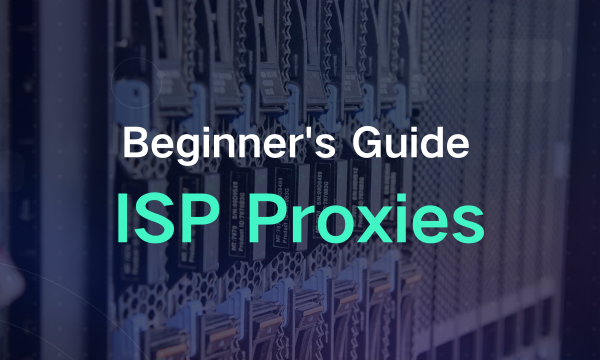The Beginner's Guide to Proxies: ISP Proxies
 BrowserScan
BrowserScan
ISP proxies, short for Internet Service Provider proxies, are a type of proxy server that uses IP addresses allocated by local internet service providers. Unlike other proxies, they blend in with regular internet traffic, making them less detectable and more reliable.
ISP proxies stand out because they offer a unique combination of stability and legitimacy. They are often referred to as static ISP proxies because they provide fixed IP addresses that do not change with each session. This feature is particularly valuable for tasks that require a consistent identity, such as managing social media accounts or conducting market research.
Types of ISP Proxies
Static ISP Proxies
These proxies give you one constant IP address. They're perfect for when you need to manage social media accounts without raising red flags. For example, if you're running multiple Instagram profiles to promote your brand, a static ISP proxy will keep each account consistent and reduce the risk of getting blocked.
Dynamic ISP Proxies
Dynamic ISP proxies switch your IP address at regular intervals. This is ideal for scraping data from websites that block or limit IP addresses after too much activity. If you're gathering competitive intelligence and need to avoid detection, dynamic ISP proxies can help you stay under the radar.
Shared ISP Proxies
These proxies are used by multiple people at once, making them more affordable. They work well for general browsing or low-risk tasks where top-level security isn't a priority. If you're doing basic market research or need a proxy for casual use, shared ISP proxies can be a cost-effective option.
Mobile ISP Proxies
These proxies use IP addresses from mobile devices and are great for tasks that require a mobile perspective. If you're developing apps and need to test them on different networks or want to see how your website performs on mobile, mobile ISP proxies provide the real-user conditions you need for accurate testing.
Geo-Targeted ISP Proxies
If you need an IP from a specific location, geographically targeted ISP proxies are the answer. They're useful for SEO professionals who want to see search results from different regions or for businesses that need to test how their ads appear in various countries. For instance, if you're launching a product in Europe and want to ensure your marketing hits the mark, these proxies can give you a local view.
ISP Proxies vs Residential Proxies
When it's time to choose between ISP proxies and residential proxies, you need to consider several factors like speed, cost, anonymity,geolocation and the scenarios in which you'll use them. Let's compare these two types of proxies based on these key aspects.
Speed
ISP Proxies: These are typically faster because they come from internet service providers with dedicated infrastructure. If you're doing tasks that require quick response times, like loading web pages or handling large amounts of data, ISP proxies are likely to perform better.
Residential Proxies: They may not match the speed of ISP proxies since they rely on the internet connection of residential users, which can vary widely. For activities where speed is less critical and appearing as a genuine user is more important, residential proxies are adequate.
Price
ISP Proxies: Generally, these are more affordable compared to residential proxies. The cost can be lower because they are sourced directly from data centers operated by ISPs, which allows for better pricing control and often results in lower prices for the end user.
Residential Proxies: They tend to be more expensive due to the complexity of sourcing them from real residential IP addresses. Since these IPs come from actual users, the process of acquiring and maintaining them is more intricate, which drives up the cost. Additionally, the high level of authenticity and lower risk of being detected or blocked by websites can justify the higher price.
Anonymity
ISP Proxies: While they offer a degree of anonymity, they might be more prone to detection as proxies by some websites, especially if the website has strong anti-proxy measures.
Residential Proxies: These offer superior anonymity because they look like real residential IP addresses. This makes them less likely to be detected and blocked by websites, making them ideal for tasks that require a high level of stealth.
Geographic Coverage
ISP Proxies: The geographic coverage of ISP proxies can vary depending on the provider. Some ISP proxy providers may offer a wide range of locations, while others might have a more limited selection. Generally, ISP proxies tend to focus on major cities and countries where data centers are commonly located. This means that while they can offer good geographic diversity, they might not cover as many residential areas or less-populated regions.
Residential Proxies: Residential proxies typically provide a much broader geographic coverage because they use the internet connections of individuals from around the world. This allows them to offer IP addresses from a wide variety of locations, including not only major cities but also smaller towns and various residential areas. As a result, residential proxies are often the preferred choice for tasks that require IPs from specific or less common locations.
Use Cases
ISP Proxies: Best for business-related tasks where speed and reliability are crucial. This includes web scraping, automated data collection, and managing multiple social media accounts or SEO tasks.
Residential Proxies: More suitable for activities that require a high level of authenticity, such as ad verification, accessing geo-restricted content, or purchasing items from websites that limit products to one per household.
Checking Proxy IP Addresses
Once you've chosen ISP proxies and set it up with your browser or an antidetect browser like AdsPower, Gologin, or Multilogin, it's crucial to make sure everything is working correctly.
BrowserScan is a website that specializes in detecting browser fingerprints and IP addresses, including both IPv4 and IPv6. After configuring your proxy, you can use BrowserScan to check for any IP address leaks. This step is essential because it confirms whether your proxy service is successful in hiding your real IP address.
FAQs about ISP proxies
Can ISP proxies help with managing multiple accounts?
Yes, ISP proxies are excellent for managing multiple accounts, especially for businesses that need to operate several social media profiles or e-commerce storefronts. Because ISP proxies are stable and fast, they help you switch between accounts quickly and efficiently without raising red flags that might lead to account suspensions.
How do ISP proxies prevent account bans when managing multiple accounts?
ISP proxies prevent account bans by providing unique IP addresses that mask your activities, making it appear as if each account is operated from a different location. This separation reduces the risk of platforms linking accounts together, which is a common reason for bans.
Is it safe to log into personal accounts using ISP proxies?
Using ISP proxies for personal accounts is generally safe, as long as you're using proxies from a reputable provider. It's important to ensure that the proxy service is secure and respects your privacy.
Are there any limits to the number of accounts I can manage with ISP proxies?
The limit to the number of accounts you can manage with ISP proxies depends on the proxy provider and the plan you choose. Some providers offer packages with a certain number of proxies, while others may offer unlimited use. Always check with your provider to understand their specific terms.
Do I need a different ISP proxy for each account?
It's best practice to use a different ISP proxy for each account to avoid detection and potential bans. This helps maintain the illusion that each account is being accessed from a different location by a different user.
Subscribe to my newsletter
Read articles from BrowserScan directly inside your inbox. Subscribe to the newsletter, and don't miss out.
Written by

BrowserScan
BrowserScan
Am I 100% anonymous? Check your browser fingerprints and IP address to find how your online identity looks👉www.browserscan.net